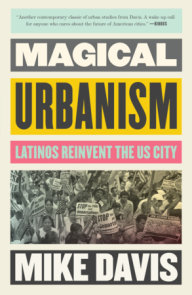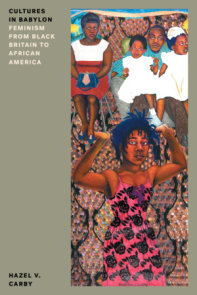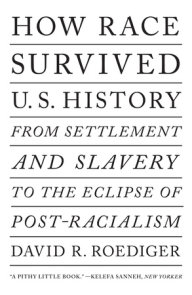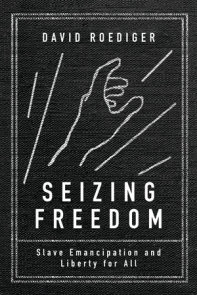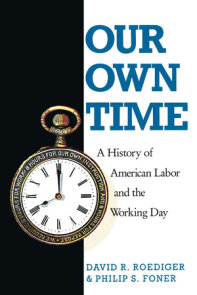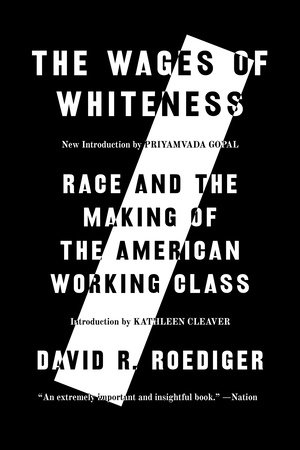

The Wages of Whiteness
By David R. Roediger
Introduction by Kathleen Cleaver
Preface by Priyamvada Gopal
By David R. Roediger
Introduction by Kathleen Cleaver
Preface by Priyamvada Gopal
By David R. Roediger
Introduction by Kathleen Cleaver
Series edited by Mike Davis and Michael Sprinker
By David R. Roediger
Introduction by Kathleen Cleaver
Series edited by Mike Davis and Michael Sprinker
Part of Haymarket Series
Category: Nonfiction
Category: Nonfiction

-
$19.95
Nov 22, 2022 | ISBN 9781839768309
-
$24.95
Jul 17, 2007 | ISBN 9781844671458
Buy the Paperback:
YOU MAY ALSO LIKE

Guns Up!

Madrigal’s Magic Key to Spanish

Mafalda 2 (Spanish Edition)
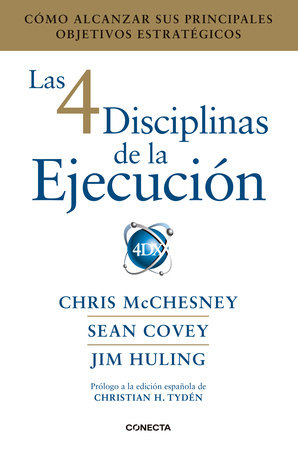
Las 4 Disciplinas de la Ejecución / The 4 Disciplines of Execution

Japanese – English Bilingual Visual Dictionary

Rethinking Diabetes

Outliers (Fuera de serie) / Outliers: The Story of Success

Mafalda 7 (Spanish Edition)

Soul Coaching Oracle Cards
Praise
“At last an American labor historian realizes that white workers have a racial identity that matters as race matters to workers who are not white.”
—Nell Irwin Painter, Princeton University
“A brilliant account of how white workers in antebellum America constructed a social identity fundamentally premised on their ‘whiteness.’”
—Steve Fraser, American Historical Review
“Far and away the best treatment of white working-class racial attitudes in the nineteenth century that I have seen”
—George M. Fredrickson
“A welcome challenge to the old and new mythmakers.”
—Noel Ignatiev, Labor [Le Travail]
“Compelling.”
—John White , Times Higher Education Supplement
“Delivers powerful insights into the collective psyche of the U.S. working class. Striking.”
—Chris Searle, Morning Star
“An important contribution to our understanding of what has often been called ‘American exceptionalism.’ Sensitive and detailed handling of a wide range of original sources.”
—Louis Kushnick, Race and Class
“Brilliant. Remarkable for its subtlety, its penetrating and honest analysis.”
—Fred Whitehead, People’s Culture
“Scholarly and thoroughly documented, The Wages of Whiteness is nonetheless a highly readable, compact and compelling narrative. A provocative illumination of the long and tortuous history of racism in the US.”
—Franklin Rosemont, Heartland Journal
“Casts a new light on a broad social, cultural and political landscape.”
—Iver Bernstein , Journal of American History
“An indispensable addition to our knowledge of American working class formation.”
—Joe W. Trotter, Journal of Social History
“In this penetrating study of the origins of white working-class racial attitudes, Roediger profoundly illuminates the new labor history. A distinctive extension of the scholarly studies that locate the nexus of American society in race and labor.”
—Joseph Boskin, Choice
“Interesting and useful. Reconstructs how labor in America made racism part of its very being.”
—John DeBrizzi, Telos
“A brilliant, authoritative, carefully researched study of major importance.”
—Michael Rogin, Radical History Review
“A real contribution to the study of the dynamic relationship that exists between the variables of race and class. A very engaging and compelling book. Wages of Whiteness will have a broad appeal to students and researchers across a wide array of disciplines.”
—Lisa Reilly and Cameron McCarthy, European Journal of Intercultural Studies
“A significant contribution, particularly necessary for those who want to see the struggle for labor unity across racial lines move forward.”
—Paul Mishler, Science and Society
“Roediger’s lasting contribution ensures that the history of race and class can no longer be written from the perspective of romantic working class heroes, nor can it be written in a spirit of self-righteous ‘anger.’”
—Barry Goldberg, New Politics
“Subtle, serious, commands our attention.”
—J. Milton Yinger , Ethnic and Racial Studies
“Roediger’s excellent book is must reading for those interested in American working-class formation.”
—Andrew Kim, Critical Sociology
“In The Wages of Whiteness David Roediger takes a courageous look at the development of white working-class racism and attempts to unravel its complex skein of economic, cultural, and psycho-political issues.”
—Soledad Santiago, Foundation News
“Of great originality and yet firmly grounded in a rich and diverse scholarship. There is no denying the enormous achievement of this book. Henceforth there will be no evading the question of racism in our contemplation of working-class formation in America.”
—David Brody, Journal of Interdisciplinary History
“Offers a compelling understanding of working-class racism. A rich and detailed history that traces notions of whiteness from the early seventeenth century to the late nineteenth.”
—Rhonda Levine, Contemporary Sociology
“Much has been written about the sources of racism and the wellsprings of racial conflict but few historians have shown David Roediger’s sensitivity to the process by which race figured in defining the very nature of American society. The author’s most important contribution is to elucidate how racial identity was critical to the formation of the working class during the nineteenth century. Roediger’s central argument is most compelling.”
—Ronald Mendel, Labour History Review
“David Roediger’s fascinating and vital study will satisfy even the most jaded intellectual palate and deserves the widest circulation.”
—Martin Crawford, History
“The book speaks so clearly to what historians know about the American working class, but with enormous originality. Broadly accessible to a wide audience, it connects the histories of slave labor and free labor thus providing a more profound understanding of American working class formation. Theoretically sophisticated, pulling together subtle but significant connections among race, class and gender. Blindingly revealing and of lasting scholarly value.”
—Organization of American Historians Prize Committee, 1992 Merle Curti Prize
“A timely and important intervention in the current debates over ‘race’ and ethnicity.”
—Catherine Hall, New Left Review
“Roediger’s exciting new book makes us understand what it means to see oneself as white in a new way. An extremely important and insightful book.”
—Lawrence Glickman, The Nation
“The Celestine Prophecy of whiteness studies.”
—SPLN
21 Books You’ve Been Meaning to Read
Just for joining you’ll get personalized recommendations on your dashboard daily and features only for members.
Find Out More Join Now Sign In






